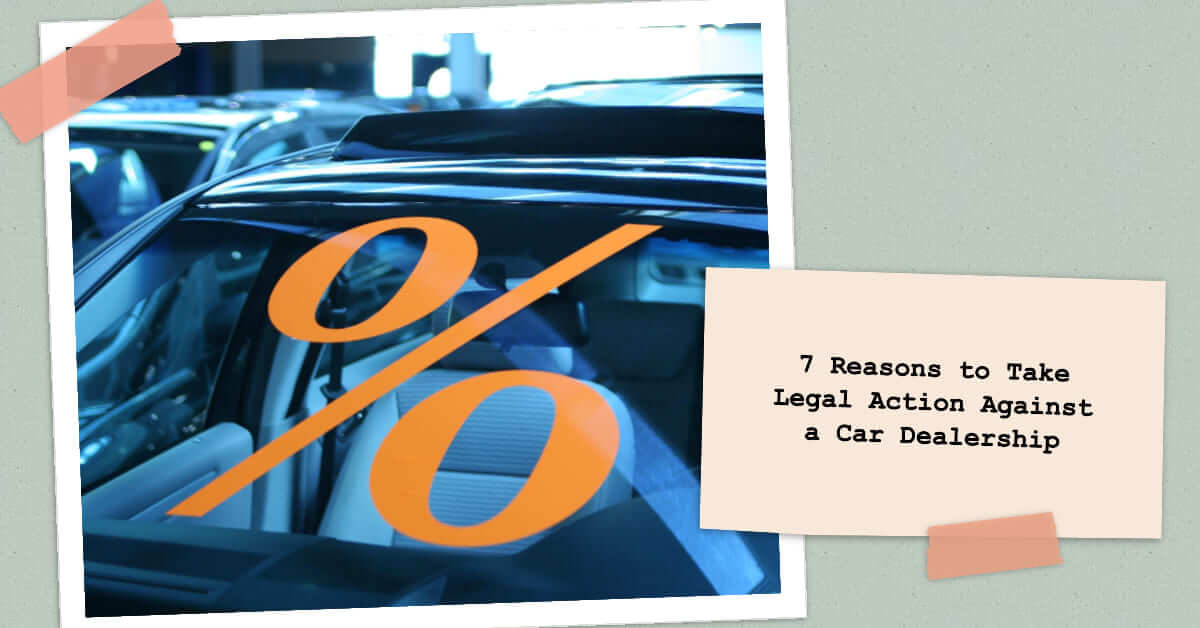In this blog post, we will explore the top seven valid reasons to sue a car dealership. From hidden fees to misrepresentations and deceptive practices, we’ll delve into the key factors that can warrant legal action against a dealership.
So buckle up as we navigate through the rocky roads of dealership disputes and uncover the reasons that may lead you to take the matter to court.
Table of Contents
Toggle7 Top Legal Reasons for Suing a Car Dealership
When you invest your hard-earned money in a car, you expect honesty, transparency, and fair treatment from the dealership.
However, not all dealerships uphold these principles, and in some cases, legal action becomes necessary to protect your rights as a consumer.
Let’s delve into the seven top legal reasons that may lead you to consider suing a car dealership and explore why each reason holds significant weight in a court of law.
1. Fraudulent Misrepresentation
One of the most compelling reasons to sue a car dealership is fraudulent misrepresentation. Dealerships have a duty to provide accurate and honest information about the vehicles they sell.
If a salesperson intentionally misleads you about the car’s condition, accident history, or warranty coverage, you may have a strong case for fraud.
Remember, you rely on the dealership’s representation when making your purchase decision, and any dishonesty on their part can lead to financial loss and emotional distress.
2. Failure to Disclose Accidents or Damages
When buying a car, you deserve to know its complete history, including any accidents or damages it may have sustained.
Some dealerships may withhold this crucial information, selling you a car with a hidden history. This unethical practice is known as “title washing” or “curbstoning,” and it can leave you with a damaged vehicle and a diminished resale value.
If you discover that the dealership concealed information about the car’s past, you might have grounds to sue a car dealership for compensation.
3. Breach of Contract
A written contract is the foundation of any business transaction, including car sales. If the dealership fails to honor the terms of the contract or engages in deceptive practices that violate the agreement, they are in breach of contract.
For example, if the dealership promised specific financing terms or included additional warranties in the contract, and then later reneges on those promises, you may have a solid case for suing a car dealership for breach of contract.
4. Deceptive Advertising
Car dealerships often invest heavily in advertising to attract customers. However, some advertisements can be misleading or false, giving consumers a false impression of the deals they offer.
For instance, a dealership might advertise a car at an incredibly low price but fail to disclose that it requires additional add-ons or has hidden fees that significantly increase the final cost.
If you were enticed by deceptive advertising and ended up making a purchase based on false claims, you could sue a car dealership for deceptive practices.
5. Unfair Trade Practices
Unfair trade practices encompass various unethical behaviors that put consumers at a disadvantage. Some dealerships may engage in high-pressure sales tactics, coercion, or bait-and-switch strategies to lure customers into making purchases.
These tactics are not only dishonest but also against the law. If you have been a victim of unfair trade practices, you have the right to seek compensation and hold the dealership accountable for their actions.
6. Breach of Warranty
When you buy a car, it usually comes with a warranty, either from the manufacturer or the dealership itself.
If the dealership refuses to honor the warranty or fails to provide the necessary repairs and maintenance as per the warranty terms, they are in breach of warranty.
It’s essential to keep detailed records of the repairs and communications with the dealership to support your claim. In such cases, suing a car dealership might be necessary to enforce your warranty rights.
7. Yo-Yo Financing Scams
Yo-Yo financing, also known as spot delivery or spot financing, is a deceitful practice where the dealership allows the buyer to take possession of the car before the financing is finalized.
Later, the dealership contacts the buyer, claiming the financing fell through, and forces them into a new financing agreement with less favorable terms.
This leaves the buyer with limited options, and they often end up paying more than they initially agreed. If you fell victim to a yo-yo financing scam, you have every reason to pursue legal action against the dealership.
Resolving Car Dealer Disputes: A Step-by-Step Guide
Dealing with a contentious situation with a car dealership can be overwhelming, but before you jump into filing a lawsuit, consider the following steps to resolve the dispute amicably:
Communication: Reach out to the dealership and discuss the issue calmly and rationally. Sometimes, misunderstandings can be resolved through open communication.
Document Everything: Keep a detailed record of all interactions, including emails, phone calls, and written communication. This documentation will be essential if you end up suing a car dealership.
Know Your Rights: Familiarize yourself with consumer protection laws and your rights as a car buyer. Understanding the relevant laws will empower you during negotiations.
Mediation: If direct communication with the dealership fails, consider mediation services or involve a third party to help facilitate a resolution.
Consult an Attorney: If the dealership remains uncooperative or if the issue is complex, seek legal counsel from an experienced attorney specializing in consumer protection and dealership disputes.
File a Complaint: If all else fails, you can file a complaint with the appropriate government agency responsible for handling consumer disputes.
Key Factors to Consider Before Initiating a Lawsuit Against a Car Dealership
Before taking legal action against a car dealership, carefully consider the following key factors:
Evidence: Ensure you have sufficient evidence to support your claim. Gather all relevant documents, records, receipts, and any other evidence that can strengthen your case.
Statute of Limitations: Be aware of the statute of limitations in your jurisdiction. Lawsuits must be filed within a certain timeframe, and exceeding it could jeopardize your case.
Legal Costs: Lawsuits can be expensive and time-consuming. Weigh the potential costs and benefits before deciding to proceed with legal action.
Settlement Options: Explore settlement options with the dealership, as going to court should be the last resort. A settlement may provide a quicker and more satisfactory resolution.
Choose an Attorney: If you decide to sue, choose an attorney with expertise in consumer protection and dealership disputes to represent your case effectively.
Class Action Lawsuits: In some cases, multiple consumers may have faced similar issues with the same dealership. Consider joining or initiating a class-action lawsuit for added strength and impact.
Conclusion
While the majority of car dealerships prioritize customer satisfaction and adhere to ethical practices, some may engage in unscrupulous behaviors that warrant legal action.
As a consumer, it’s crucial to know your rights and stand up against deceptive practices.
If you find yourself facing any of the top seven valid reasons to sue a car dealership, remember to gather evidence, consider alternatives to litigation, and consult with a knowledgeable attorney.
By taking appropriate action, you can seek justice and protect yourself and others from falling victim to unethical dealership practices in the future. Happy car shopping, and may your road to justice.
























